PyTorch is an open-source machine learning framework that allows users to train neural networks using Python. It has gained immense admiration from the community for its flexibility and usability.
As a career skill, PyTorch is exceptionally lucrative. According to Payscale, PyTorch practitioners earn as much as $108000 per year on average. This number may increase many times if you advance to a senior role.
Hence, if you want to pursue a lucrative machine learning and AI industry, you need to have a robust knowledge of Pytorch and its applications. Otherwise, your skillsets are unlikely to fit the job requirements.
PyTorch is not too difficult to learn. You can master PyTorch by taking Pytorch tutorials and online courses. Unfortunately, only very few of them are of high quality. You still need to spend hours researching to find the course that works.
Hence, I decided to write this post to provide you with the best PyTorch courses to take. You just need to conduct short research to find those that fit your preferences and start learning right away.
Affiliate Disclosure: This post from Victory Tale contains affiliate links. We will receive a small commission from the course providers if you purchase through them.
Nonetheless, we always value integrity and prioritize our audience’s interests. You can rest assured that we will present each course truthfully.
Things You Should Know
Prerequisites
As a Python framework, PyTorch is indeed not for absolute beginners. You will need to have a strong background in the following:
You don’t need to take a machine learning course before enrolling. However, basic knowledge of it can be beneficial.
Criteria
Below are the criteria for the best PyTorch courses:
1. Intro to Machine Learning with PyTorch
This Nanodegree program from Udacity will equip you with all PyTorch fundamental skills. You will learn how to implement various techniques to build machine learning and deep learning models.
Compared to other Pytorch courses on this list, this program unarguably offers one of the most comprehensive learning experiences. Unlike other alternatives that teach mostly deep learning, this one will start with machine learning algorithms. Thus, it is far more beginner-friendly.

Course Content
Created in collaboration with Kaggle and AWS, this program consists of three minor courses as follows:
1. Supervised Learning – The first course will kickstart your journey with machine learning. You will learn about key concepts such as linear/logistic regression, perception algorithms, decision trees, Naive Bayes, Support Vector Machines (SVMs), and many more.
Subsequently, you will perceive all the steps to train various models with PyTorch and learn how to evaluate the results and choose the best ones using model testing techniques.
2. Deep Learning/Neural Networks – The second course will first introduce you to neural networks and relevant concepts, including gradient descent and backpropagation. Later, you will use PyTorch to build deep learning models and use various techniques to prevent or minimize errors.
3. Unsupervised learning – The third course will introduce you to various data clustering techniques, such as the K-means algorithm, Single Linkage Clustering, or Gaussian Mixture Models. You will then understand how to implement methods for different problem domains.
Apart from the informative lessons and coding assignments, you will work on a large-scale, real-world project in each course.
For example, you will use PyTorch to create models to find the best strategy for a hypothetical charity to obtain donors in Course 1. Completing them can not only strengthen your skills through hands-on experience but also build your job-ready portfolio.
Regarding the pace, most students complete the program in 3 months (the weekly commitment is 10 hours per week). Still, the program is 100% self-paced. Feel free to create a personal study schedule.
You can download the course syllabus through the link below to learn more about the course content.
Student Support
Udacity is one of the few online course providers that offers full-fledged student support, comparable to the one provided by web development or data science bootcamps. Once you enroll, you can access the following student support:
Technical Mentor Support – If you get stuck or encounter technical issues, you can access your mentor 24/7 through the chat interface on Student Hub. Hence, you can be confident that you can reach out for assistance at any time.
Most students receive a reply within an hour, which is much faster than typical online courses that student support rarely exists. In other words, you don’t need to wait weeks for an instructor’s reply anymore.
Project Reviews – You can request experts to review your work at any time. They will provide feedback, tips, techniques, and best practices to make you a better PyTorch user.
Furthermore, Udacity does not limit the number of requests you can send for each program. Thus, you can always ask for feedback without the need to complete a specific milestone.
This kind of student support differentiates Udacity’s program from other online courses.
Career Services – Once you complete the program, you can access Udacity’s career services. The team will optimize your resume, Github portfolio, and LinkedIn profile to make them up to professional standards and eliminate potential mistakes that may deter you from receiving interview invitations.
Pricing
All Udacity programs require a subscription. This program costs $399 per month. However, you can opt for a 3-month bundle and receive a 15% discount, lowering tuition fees to $339 monthly.
In addition, you can create a Udacity account to access personalized discounts (like I did below), which can be as high as 75%.
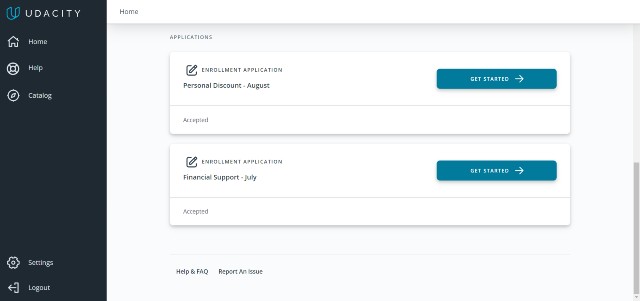
The best thing is that Udacity allows you to use it on top of the bundle. Thus, your final tuition fees will be $100 or even lower.
[sc name=”udacity” ][/sc]Pros & Cons
Pros
- Learn from a team of high-caliber machine learning engineers
- Easy-to-follow curriculum, created in collaboration with Kaggle and Amazon Web Services (AWS)
- In-depth lessons with clear, intuitive explanations and real-world examples
- Beginner-friendly, covering machine learning and deep learning concepts
- Offer three large-scale, real-world projects to complete, which is excellent for building a job-ready portfolio to showcase your skills to prospective employers.
- Timely mentor support + Unlimited Project Reviews
Cons
- Far more expensive than other online PyTorch courses
- Udacity’s projects can be challenging and time-consuming to complete. Some students may need many more hours than suggested.
2. Developing Deep Learning Models Using PyTorch
This two-course series from IBM (available on edX) offers excellent PyTorch training for beginners. You will learn the entire process of creating deep learning models with PyTorch.
Note: Unless you possess prior knowledge of machine learning algorithms and PyTorch, you should not skip the first course.
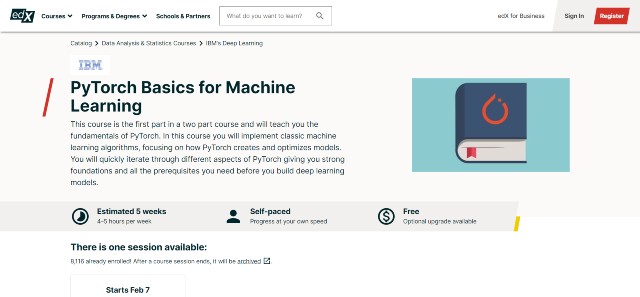
2.1) PyTorch Basics for Machine Learning
The first course in the series will cover the following topics:
- PyTorch sensors in one or two dimensions
- Autodiff in PyTorch and integration with NumPy and Pandas
- Linear regression model with relevant concepts and techniques
- Methods to train a linear regression model + extend your model to multiple inputs with PyTorch
- Linear Classifiers, Logistic Regression with PyTorch
- and many more
Overall, you will learn to implement classic machine learning models. Upon completion, you will have sufficient PyTorch knowledge to proceed to the second course in the series.
Suggested Pace: 5 Weeks, 4-5 hours per week
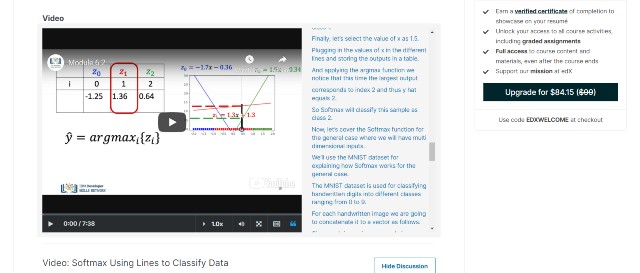
2.2) Deep Learning with Python and PyTorch
The second course will continue from where the first has left off. You will proceed to the following topics:
- Multiclass Classification
- Feedforward deep neural networks in PyTorch
- Steps to adjust hyperparameters
- Methods to build deep neural networks such as dropout and batch normalization
- Convolutional neural networks (CNNs)
- Computer Vision Networks
- Dimensionality Reduction and Autoencoders
In essence, this course will provide you with the skills to build deep neural networks and deep learning pipelines with PyTorch.
Suggested Pace: 2-4 hours per week for six weeks
Pricing
The series is free to audit. However, you cannot access graded assignments and receive a digital certificate. The former is essential for building your PyTorch skills. Hence, I suggest you opt for a verified track instead.
A verified track provides full access to the course. The pricing is $99 for each.
Note: This two-course series is part of the Professional Certificate in Deep Learning program. You can enroll in this program ($525 in tuition fees) instead to gain full access to the series and other four courses that will teach deep learning with Keras and Tensorflow.
Note #2: IBM offers another course on Coursera that essentially covers the same topics. If you are a Coursera Plus subscriber, you may want to select this option to gain full access without paying additional course fees.
Pros & Cons
Pros
- Well-structured curriculum
- Bite-sized video lessons with clear explanations
- Provide a final exam to test your cumulative PyTorch knowledge
- Readable transcripts
- Free auditing
Cons
- The course content is not very in-depth compared to other alternatives.
3. PyTorch: Deep Learning and Artificial Intelligence
This Udemy course is an affordable alternative to learn PyTorch basics and its core applications. You will learn from Lazy Programmer, a veteran AI and machine learning engineer with years of teaching experience.
Note: The lessons are pretty math-heavy. It would be best if you had a strong foundation in calculus before taking this course.
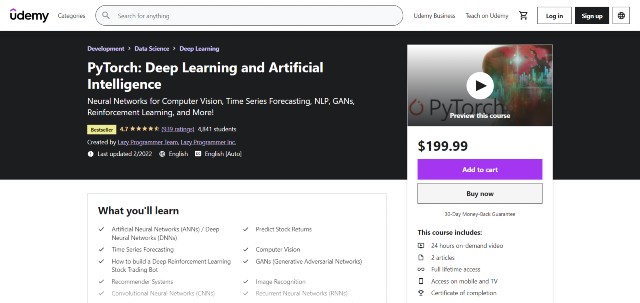
Course Content
The video content of this course is 24 hours long, comprising the following topics:
- Introduction to Google Colab
- Regression, Linear Classification, (Train/Validation, Test) Sets
- Feedforward Artificial Neural Networks (ANNs) – Multiclass Classification, ANN for Image Classification and Regression
- Convolutional Neural Networks (CNNs)
- Recurrent Neural Networks (RNNs), GRU, LSTM, and Sequence Data
- Natural Language Processing (NLP)
- Recommender Systems with Deep Learning
- Transfer Learning
- Facial Recognition
- GANs and Deep Reinforcement Learning
- Loss Functions and Gradient Descent
The curriculum is comprehensive, covering all aspects of deep learning with PyTorch. The instructor will separate all the lessons into two parts (theory and code), making them highly easy-to-follow.
Also, you can put the knowledge you have learned into use through completing a project. For example, you will build deep learning applications to forecast stock prices. This will help you gain some practical experience.
However, the focus is on the theory. This course will work best if you want to figure out how things work behind the scenes. You will need another course if you want a thorough guide on building deep learning applications with PyTorch.
Reviews: 4.7/5.0 from 4800+ students
Pros & Cons
Pros
- Learn from an expert in machine learning and AI
- Comprehensive curriculum, covering all major deep learning architectures
- In-depth video lessons with straightforward explanations
- The instructor frequently updates his content.
- Lifetime Access + 30-day money-back guarantee
- Inexpensive ($20 or lower when on sale)
Cons
- The lessons are math-heavy. Thus, it may not be optimal for some students.
- Few coding exercises
4. A Deep Understanding of Deep Learning (with Python Intro)
Suppose all the above courses are not in-depth enough for your study. In this case, I suggest you take this Udemy course from Mike X Cohen, a neuroscientist with two decades of experience in data science.
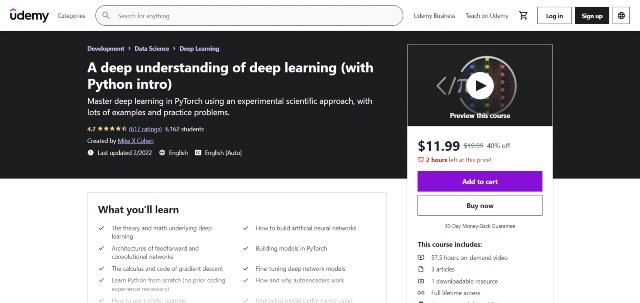
Course Content
This video course is 57.5 hours long. Below is a summary of what you will learn from it.
- Python Review
- Deep Learning Concepts: How models “learn,” Comparison between artificial and biological neurons
- Math Reviews (mainly Probability & Statistics)
- Gradient Descent in 1D and 2D
- Deep dive into ANNs
- Overfitting and Cross-Validation
- Regularization and Metaparameters
- Feedforward Networks
- Handling data-related issues (unbalanced data, data oversampling, noise/feature augmentation, etc.)
- Model Evaluation
- Autoencoders
- Convolutional Neural Networks (CNNs)
- Transfer Learning and Style Transfer
- RNN (Recurrent Neural Network) and GAN (Generative Adversarial Network)
- Ethics of Deep Learning
According to my observations, the instructor apparently puts effort into explaining both the theory and math in detail. This course will walk you through the intuition of all the background processes, formulas, and mechanisms behind deep learning through the experimental scientific approach.
This will build a strong foundation for you to implement all of the stuff using PyTorch handily.
Generally, besides its highly informative lessons, I think the best part of this course is its numerous examples, coding challenges, and real-world projects. You will always have sufficient resources to help you grasp key concepts and develop your practical skills.
Reviews: 4.7/5.0 from 6100+ students
Pros & Cons
Pros
- Unarguably one of the most in-depth PyTorch courses
- Well-structured and comprehensive curriculum, featuring the right mix of theory and application
- Informative lessons with straightforward explanations: To explain the complex stuff, the instructor will stack basic concepts on top of each other.
- Include plentiful examples, coding challenges, and projects
- Lifetime Access + 30-day money-back guarantee
- Inexpensive ($20 or lower when on sale)
Cons
- Because of its immense length, completing an entire course would require a significant commitment.
Other Alternatives
Datacamp – Datacamp offers a PyTorch tutorial for deep learning. However, the content is not very in-depth. Unless you are already a Datacamp subscriber, I don’t think this course is worth taking.
PyTorch for Deep Learning with Python Bootcamp – This Udemy course from Jose Portilla is an excellent tutorial for students to learn basic PyTorch. However, the course has not been updated for two years. Thus, most of its content is now outdated.
Deep Learning with PyTorch for Medical Image Analysis – Targeted medical practitioners, this course explains how to use PyTorch in medical imaging. You will learn how AI can be instrumental in detecting cancers and heart problems.
Related Courses
TensorFlow – Besides PyTorch, Tensorflow is one of the most popular deep learning libraries, thus a compelling skill set to master.